The court can make the following orders under section 8 of the Children Act 1989:-
a child arrangements order; prohibited steps order and a specific issue order. A child arrangements order is an order specifying with whom a child shall live and when the child spends time with another. A prohibited steps order prevents a party from making certain decisions about a child’s upbringing and a specific issue order deals with a specific question about how a child is being brought up e.g. what school they should go to.
For the purpose of the Children Act 1989 a ‘relative’ is defined as any of the following;- grandparent, brother, sister, aunt, uncle, step-parent.
The Act stipulates prospective applicants who can apply for one of the above orders without the court’s permission and those who must obtain permission before making an application.
A relative e.g grandparent, does not need permission to apply for a child arrangements order specifying the child living arrangements if the child in question has lived with them for one year immediately preceding the application. However, such a relative would need permission to apply for a specific issue or prohibited steps order or even an order stipulating when a child is to spend time with another person.
If a child has lived with a prospective applicant who is not defined as a relative under the Children Act, such as a cousin, for at least three years, they may apply for a child arrangements order without permission. However, permission would still be needed to apply for a specific issue a prohibitive steps order.
For a prospective applicant with whom the child has lived for the required period but with whom the child is no longer living, the application must be made within 3 months of the time they last lived with the child, otherwise permission will be required to apply for a child arrangements order.
With all applications for a child arrangements order, unless a certain exemption applies, the applicant must attend a MIAM (Mediation Information and Assessment Meeting). However, an application for permission to apply does not require the attendance at a MIAM. There is usually a cost for attending a MIAM.
A court fee is payable of £215 to make an application for permission unless the applicant is eligible for a fee exemption. If permission is granted, no further fee is payable. A Form C100 is completed.
Upon receipt of an application for permission, the Court may of its own initiative, make directions about the filing of evidence.
The Court shall have particular regard to the following factors when determining whether to grant permission;-
If permission is granted, the applicant can go on to make a substantive application. However, success at the permission stage does not create a presumption that the main application should be granted. Once permission is granted, the child’s welfare is the paramount consideration and the welfare checklist under section 1 of Children Act applies.
There is no presumption that spending time with a grandparent , or any other extended family member is in a child’s best interests. In Re A ( A minor) the Judge presumed that a parent should have contact with the child unless there are cogent reasons to the contrary. This presumption does not however, apply to any other family members. In the same case, it was suggested that the burden remains on the applicant who is an extended family member, to demonstrate that in the particular circumstances of the case, contact is in the child’s best interests. Only then does the burden shift to anyone opposing contact to show why it should not take place.
The courts do, however, recognise the value to a child of spending time with extended family members, in particular, grandparents.
If you require advice or assistance with any child arrangements applications do not hesitate to give RJT Solicitors a call on 01257 228027.








